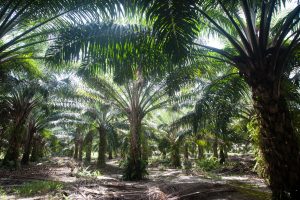Indonesia and Malaysia will soon send envoys to the European Union to discuss the impact of the bloc’s recently passed deforestation law on their economically important palm oil sectors.
The announcement was made after a meeting yesterday between Airlangga Hartarto, Indonesia’s coordinating minister for economic affairs, and Malaysia’s Commodities Minister Fadillah Yusof, in which they discussed “several pressing issues” related to the palm oil industry, the Malaysian state media service Bernama reported.
“We agreed to continue to protect the palm oil sector by strengthening efforts and cooperation to overcome discrimination against the palm oil industry,” Airlangga told reporters. “The meeting (with Malaysia) agreed to conduct a joint mission to the EU to communicate and prevent unintended consequences of the regulation to the palm oil sector and seek possible collaborative approaches with interested parties.”
The announcement comes after the EU’s passage in December of a regulation that will “ensure that a set of key goods placed on the EU market will no longer contribute to deforestation and forest degradation in the EU and elsewhere in the world.” The regulation, according to the EU, “sets strong mandatory due diligence rules for companies that want to place relevant products on the EU market or export them.”
While the law does not apply only to palm oil – it will also apply to cattle, soy, coffee, cocoa, timber, and rubber, as well as their various derivatives – it is likely to have an outsized impact on the sector, which has been strongly linked to the destruction of large swathes of tropical rainforest.
Indonesia and Malaysia, the world’s two largest producers of palm oil, have been harshly critical of the law, just the latest European policy that could impact their palm oil sectors. Both Malaysia and Indonesia also lobbied against its passage. Kuala Lumpur even went so far as to threaten to halt palm oil exports to the EU, its third-largest buyer of the product, altogether, though the two officials seemed to strike a more diplomatic note after yesterday’s meeting.
Airlangga said the issue of an export boycott was not raised. “An export stoppage was not discussed … it was not an option,” he said, according to Reuters. He and Fadillah said that the envoys dispatched to the EU would attempt to convince European officials and potential buyers that the nations’ sustainability certifications, known as ISPO and MSPO, already met international standards and should be recognized in Europe.
“We always strive to comply with regulations on the palm oil industry, but they must be fair and understand the situation in both countries, where we try to help smallholders come out of poverty,” Fadillah said, adding that the envoys would “bring along representatives of smallholders to give our views.”
Indeed, the Roundtable on Sustainable Palm Oil, an industry watchdog group, this week stated that smaller producers in Asia, Africa and Latin America – even those that harvest palm oil sustainably – would find it hard to comply with the EU’s rigorous standards and “may be forced to bear” the consequences of the regulation.
































